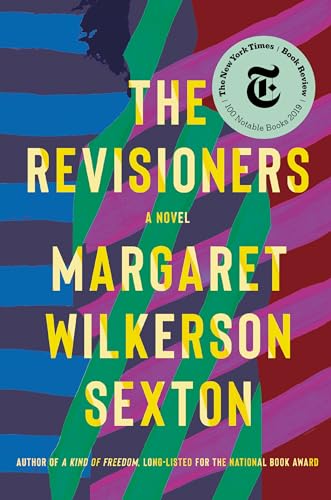Here’s a quick look at some notable books—new titles from Maggie O’Farrell, Margaret Wilkerson Sexton, A.M. Homes, and more—that are publishing this week.
Want to learn more about upcoming titles? Then go read our most recent book preview. Want to help The Millions keep churning out great books coverage? Then become a member today.
The Marriage Portrait by Maggie O’Farrell
Here’s what Publishers Weekly had to say about The Marriage Portrait: “This lush, provocative historical from National Book Critics Circle Award winner O’Farrell (Hamnet) follows a young woman who is married off at 15 amid the complex world of 16th-century Italian city-states. O’Farrell bases her heroine, Lucrezia de’ Medici, on a real-life figure depicted in Robert Browning’s poem ‘My Last Duchess,’ who was murdered by her husband. When the reader first meets Lucrezia, she’s been married for not quite a year and faces mortal danger in what O’Farrell describes as a ‘wild and lonely place.’ The narrative moves back and forth from the nearly deserted fortress where Lucrezia plays a game of cat and mouse with the duke of Ferrara, the husband who might be attempting to kill her, and the events that have brought her here. As a child of a noble family in Florence, she was untamable and passionate about making art. Now, the duke grows increasingly impatient with her as she fails to produce the heir he needs to secure his position. O’Farrell excels at sumptuous set pieces: Lucrezia’s encounter with a tiger her father keeps in the basement beneath their palace, the wedding where she is draped and almost swallowed up by her gown, her meetings with the mysterious figures at her new home, particularly her enigmatic husband. By imagining an alternative fate for Lucrezia that deviates from the historical record, the author crafts a captivating portrait of a woman attempting to free herself from a golden cage. Fans of the accomplished Hamnet won’t be disappointed by this formidable outing.”
On the Rooftop by Margaret Wilkerson Sexton
Here’s what Publishers Weekly had to say about On the Rooftop: “Sexton (The Revisioners) broadly reimagines The Fiddler on the Roof in an affecting family story set in a rapidly changing historically Black San Francisco neighborhood. It’s 1953, and people from all walks of life pack the Champagne Supper Club to see the latest jazz and R&B performers. On Fridays, they cheer the Salvations, hometown favorites made up of sisters Ruth, Esther, and Chloe Jones. Now in their early 20s, the sisters’ talents have been relentlessly forged during countless rooftop rehearsals run by their mother, Vivian, a widow whose hopes for her daughters all center on their musical superstardom. Just as Vivian’s dream seems within reach, though, her daughters yearn for independence, with Chloe eyeing a solo career and Esther wanting to join the civil rights movement. Meanwhile, white developers begin disrupting Vivian’s Black Fillmore neighbors— many of whom, like Vivian, fled racial violence in the deep South—with eminent domain proceedings. In alternating viewpoints, Sexton depicts the nuances of familial relationships, including the sisters’ combination of loyalty and jealousy, as well as the complex and changeable nature of regret. The historical milieu is less sharply drawn, with celebrity cameos too often standing in for concrete details of time and place. Nevertheless, Sexton brings undeniable power to her depiction of dreams fragmented and deferred.”
If I Survive You by Jonathan Escoffery
Here’s what Publishers Weekly had to say about If I Survive You: “Escoffery’s vibrant and varied debut, a linked collection, chronicles the turbulent fate of a Jamaican American family in Miami. Trelawny, the main character in most of the entries, is the younger of two sons. He questions where his light skin places him within America’s racial categories and where he fits into family hierarchy: ‘You want to prove your father bet on the wrong son,’ Trelawny narrates in the title story, addressing his father’s favorable treatment of his older brother, Delano, an arborist and musician. ‘In Flux’ recounts Trelawny’s liberal arts education as he leaves Miami and attends college in the colder, and more racially homogenous, Midwest. ‘Odd Jobs,’ ‘Independent Living,’ and the title story center on the strange and ethically dubious gigs Trelawny takes to survive, including a running stint as a voyeur for a rich Miami couple, asking himself all the while: ‘What kind of employee are you? And just what kind of man?’ Two stories exert a thrilling dramatic pull: In ‘Splashdown,’ Trelawny’s cousin Cukie learns the lobster trapping trade, and something darker, from his estranged father; and ‘If He Suspected He’d Get Someone Killed…’ follows Delano rushing to secure a bucket truck and a tree-trimming contract before a dangerous storm arrives. This charged work keeps a tight hold on the reader.”
What We Fed to the Manticore by Talia Lakshmi Kolluri
Here’s what Publishers Weekly had to say about What We Fed to the Manticore: “The unifying premise of Kolluri’s exquisite debut collection—stories narrated from various animal perspectives—might seem gimmicky or cute, but it’s neither. Instead, these nine exceptional stories, centered on a variety of mammal and bird species and set in global locations ranging from the Sundarbans to the open ocean, from the arctic to Delhi, feel both timeless and urgent. Each deal in some way with the disruptions wrought by humans on the natural world and on nonhuman species. These include war (‘The Good Donkey,’ set in a Gaza zoo), hunting and poaching (in a pair of nearly unbearably sad stories, one set in Yellowstone, the other in Kenya), and technological disruptions. Perhaps inevitably, climate change is either explicitly or implicitly at the heart of several of these tales, including the title story, in which man-eating tigers realize there’s something menacing their home that’s even more dangerous than their own kind. A list of sources points to the real-world incidents and phenomena that inspired Kolluri, such as an Atlantic article titled ‘Why Did Two-Thirds of These Weird Antelope Suddenly Drop Dead?’; the context serves to make the author’s treatment that much more remarkable. Joy might understandably be in short supply in settings defined by mass extinctions and climate crisis, but the exceptional closer, ‘Let Your Body Meet the Ground,’ soars on the promise of human kindness, no matter how small. This remarkable collection leaves an indelible mark.”
The Deceptions by Jill Bialosky
Here’s what Publishers Weekly had to say about The Deceptions: “Bialosky (The Prize) contests patriarchal notions about life, marriage, and art in her clever if uneven latest. An unnamed poet and teacher regularly visits the Metropolitan Museum of Art, her refuge and source of inspiration. Through the lens of Greek and Roman mythology, she traces the gradual unraveling of her marriage after her son leaves for college in Maine, as well as her complicated friendship with a man she calls the ‘Visiting Poet,’ who arrives from Ohio for a yearlong fellowship at her school. The narrator draws parallels between her life and the tribulations of Heracles and Odysseus (‘What labors must I endure for what I’ve done?’ she asks herself, looking at a bust of Heracles), and the explosive third act considers the myth of Leda and the Swan, prompting deeper questions on the autonomy of female desire in the face of male dominance (‘Who is the true abductor, the victim or the perpetrator?’). It also inspires her next book. Despite the shocking betrayal-fueled climax, Bialosky’s messages on feminism are a bit pat—as one character says, ‘we have not come further as a society’ since Mary Wollstonecraft’s ‘intellectual equals’ declaration of 1792. Still, Bialosky’s sensuous evocation of longing and regret will no doubt linger in readers’ minds.”
Solito By Javier Zamora
Here’s what Publishers Weekly had to say about Solito: “Poet Zamora (Unaccompanied) presents an immensely moving story of desperation and hardship in this account of his childhood migration from El Salvador to the U.S. To reunite with his parents—who left during the Salvadoran Civil War—nine-year-old Zamora was forced to rely on the help of coyotes to get to America in 1999. But, as he relates in affecting detail, the voyage for his group was perilous and trust was a rare commodity. What was supposed to be an easy two-week trip became a two-month nightmare pocked with seedy characters, days spent locked in various hideouts before moving, and a never-ending stream of promises shattered. Between dangerous marches through the desert and being caught at the U.S. border multiple times, Zamora’s group was forced to depend on one another for survival. The surrogate family they formed offered Zamora respite from the despair, and he transforms the experience into a stirring portrait of the power of human connection. Rendering the end of their journey in a final heartbreaking scene, Zamora writes, ‘I can feel my heart in my stomach… I close my eyes and take a long sniff. Their sweat, the smell of loroco and masa, is faint, but it’s them.’ This sheds an urgent and compassionate light on the human lives caught in an ongoing humanitarian crisis.”
The Unfolding by A.M. Homes
Here’s what Publishers Weekly had to say about The Unfolding: “Homes follows Days of Awe with a satiric misfire about a wealthy Republican donor and his family in the wake of the 2008 U.S. presidential election. At the center is a 60-something money man called the ‘Big Guy’ who forms a small clandestine organization with like-minded Republican men to erode American trust in Democratic Party agendas. Meanwhile, the Big Guy’s alcoholic wife, Charlotte, attempts suicide, is shipped off to the Betty Ford Center, and grows close to another resident, Terrie. The Big Guy’s 18-year-old daughter, Meghan, begins to question her sheltered upbringing after she learns some family secrets. Throughout, Homes injects her signature wit (on the choice of Sarah Palin for John McCain’s running mate, the Big Guy says, ‘If you want to appeal to women voters, don’t pick an idiot’), but most of the supporting cast are caricatures, and far too often, when meeting with the Big Guy to plot their retribution, they ramble on interminably. Homes loses the balance provided by the three family members, and though she makes a stab at tying up loose ends in the final pages, it’s too little, too late. While the novel sparks when exploring the political underground, it never fully ignites.”








